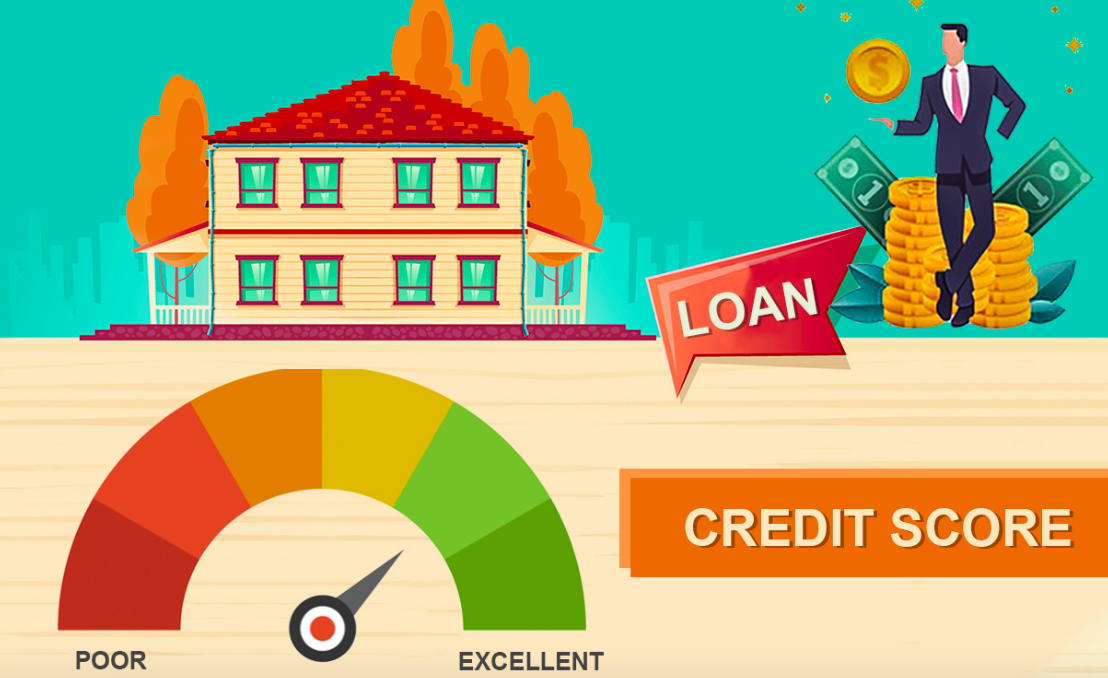A Credit Score is a three-digit number that rates the homebuyer’s creditworthiness. It is true that having a good credit score gives homeowners better mortgage rates and saves them money. The homebuyer’s credit score is an important indicator of their financial health, as well as a tool they can use to live a better life. FICO scores range from 300 to 850. The higher the credit score, the more likely the homebuyers are to get approved for mortgage loans and for better rates.
In Mortgage lending, credit scores are a probability statistic and objective measure of a homebuyer’s risk to the mortgage lenders. The higher Credit scores correlate to lower lending risk. The most common credit score rating model is the FICO Score which was named for Fair Isaac Corporation. FICO Credit scores are based on five weighted categories that combine to generate a rating between 300 and 850, with 850 being the highest credit score possible. A homebuyer with higher credit scores is more likely to make a mortgage payment in the next 90 days, which reduces the risk of defaults.
Credit Scores are essentially snapshots of any individual’s credit history, and they can affect everything from lending decisions and mortgage terms to rental applications and mortgage insurance premiums. A Credit Score shows how well a homebuyer handles debt and how likely they are to repay a mortgage loan on time. Homebuyers can think of a credit score as a financial wellness indicator, especially in terms of qualifying and applying for a mortgage loan. The Mortgage lenders will request homebuyers’ credit reports from one or more of the credit bureaus to assess how risky it is to lend to them. The lenders will use credit reports to determine whether a homebuyer meets the terms of an existing credit account.
What Is Credit Score?
A Credit Score is a 3-digit number that represents a numerical expression of a borrower’s health. The Credit Score is designed to help mortgage lenders assess risk specifically, the likelihood that they will become lawless on their credit obligations in the next 24 months. A Credit Score is based on the homeowner’s credit history, which includes information like the number of accounts, total levels of debt, repayment history, and other factors. Mortgage lenders use Credit Scores to evaluate homebuyers credit worthiness, or the likelihood that they will repay loans promptly.
There are many different credit scoring models out there, but the FICO credit score is the most popular and widely used in the United States of America. Another popular scoring model that is used is the VantageScore, and there are several different models of VantageScore out there too. When it comes to FICO Credit scores then the homeowners will have three different ones. That’s because of three credit bureaus such as Experian, Equifax, and TransUnion that assign homebuyers a credit score based on their internal processes and the information they have in their reports.

How Does a Credit Score Work?
A Credit Score significantly affects the homebuyer’s financial life. It plays a key role in the mortgage lender’s decision to offer them credit. Mortgage lenders are more likely to approve homebuyers for loans when they have a higher credit score and more likely to decline the mortgage loan application when they have low credit scores. Homebuyers can get a better rate of interest when they have a higher credit score which can save money in the long term. A credit score of 700 or higher is generally viewed positively by mortgage lenders and may result in lower interest rates. Credit scores greater than 800 are considered excellent. Here are the quick details of credit scores:
- Excellent: 800–850
- Very Good: 740–799
- Good: 670–739
- Fair: 580–669
- Poor: 300–579
Minimum Credit Score Criteria For Different Types of Mortgage Loan
| Type Of Mortgage Loan | Minimum FICO Credit Score |
| FHA Mortgage | 500 minimum FICO |
| VA Mortgage | 580 minimum FICO |
| Conventional Mortgage | 620 minimum FICO |
| USDA Mortgage | 620 minimum FICO |
A homebuyer can get approved for a mortgage Loan with a 500 FICO score or higher.
How A Credit Score Is Calculated?
There are five main factors are evaluated when calculating a Credit Score:
- Payment history (35%)
- Amounts owed (30%)
- Length of credit history (15%)
- Types of credit (10%)
- New credit (10%)
- Payment History: The Payment history indicates whether a homebuyer has paid their bills on time. It takes into account how many late payments homebuyers have had and how late they were.
- Amount Owed: It is the percentage of credit the homeowners have used compared to the credit available to them, which is known as credit utilization.
- Length and Credit History: The longer credit histories are considered less risky as there is more data to determine the payment history.
- Types of Credit or Credit Mix: A variety of credit types show lenders they can manage various types of credit. It can include installment credit such as mortgage loans and revolving credit such as credit cards.
- New Credit: The Mortgage Lenders view new credit as a potential sign that homebuyers may be desperate for credit. Too many recent applications for credit can negatively affect the Credit Score.
How To Improve A Credit Score?
Homebuyers can generally improve their credit scores by following these tips:
- Pay Bills on time: On-time credit payments can help build a good credit score, while late or missed payments can hurt them.
- Increase the Credit Line: If the homebuyers have credit card accounts, then call and inquire about the credit increase. If the homebuyer account is in good standing, they should be granted an increase in their credit limit.
- Don’t close a Credit Card Account: If the homebuyers are not using a certain credit card, it is best to stop using it instead of closing the account. Depending on the age, and credit limit of a card, it can hurt the homebuyer’s credit score if they close the account.
- Work with one credit repair company: If homebuyers don’t have time to improve their Credit Score, credit repair companies can negotiate with their creditors and the three credit agencies, in exchange for monthly fees.
- Correct any errors on Credit Reports: The homebuyers are entitled to one free credit report per year from each of the main credit bureaus.
How To Check A Credit Score?
The homebuyers can get a free copy of their credit reports from AnnualCreditReport.com, but they won’t actually see their scores. However, there are plenty of ways to get a free look at your credit score. Capital One’s CreditWise program and Chase’s Credit Journey are also available to all consumers whether they are customers or not, and both let them see a version of their TransUnion credit score.
Frequently Asked Questions (FAQs)
Question 1: What Is a Good Credit Score?
Answer: A good credit score will ultimately be determined by the mortgage lenders. The credit score ranges vary depending on the credit scoring model. Generally, credit scores from 580 to 669 are considered fair, Credit Scores ranging from 670 to 739 are considered good, credit scores from 740 to 799 are considered very good, and 800 and higher are considered excellent.
Question 2: Can I Get a Mortgage Loan with a low Credit Score?
Answer: Yes, homebuyers can get mortgage loans with low credit scores all the time. However, with a low credit score, mortgage interest rates might be slightly less favorable.
Question 3: How Can I Raise My Credit Score Quickly?
Answer: To raise your Credit Score quickly, you can enroll in all services that include other payment information such as rent payments and utilities payments that are not typically included in your credit score. If homebuyers have a good track record with these kinds of bills, enrolling in a service like Experian Boost could raise their credit score quickly.
Question 4: Who Calculates Credit Scores?
Answer: There are 3 major credit bureaus in the United States of America such as Equifax, Experian, and TransUnion. They each calculate the homebuyer’s FICO Credit score in different ways using the same information. Credit bureaus collect, analyze, and disburse information about consumers in the credit markets.
The Final Verdict
Credit Score is a number that can have a significant impact on an individual’s financial life. If homebuyers have good credit scores then they are more likely to qualify for Mortgage Loans and to receive better terms that can save their money. Learning the basics about credit scores is a great thing, and the next step is to establish and build a good credit history. homebuyers have to Keep focusing on paying bills on time and they could work toward an excellent credit score that helps them qualify for the best offers and mortgage rates.
